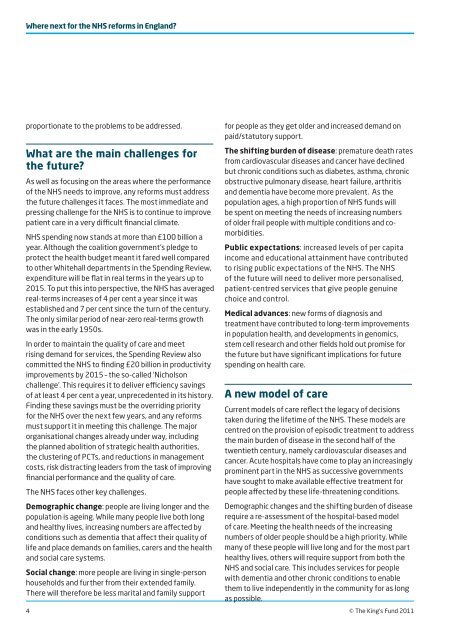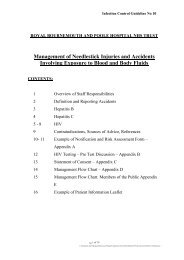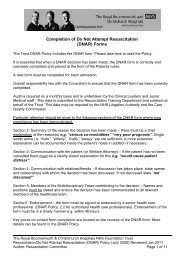View June's Board Pack - Royal Bournemouth Hospital
View June's Board Pack - Royal Bournemouth Hospital
View June's Board Pack - Royal Bournemouth Hospital
- No tags were found...
Create successful ePaper yourself
Turn your PDF publications into a flip-book with our unique Google optimized e-Paper software.
Where next for the NHS reforms in England?proportionate to the problems to be addressed.What are the main challenges forthe future?As well as focusing on the areas where the performanceof the NHS needs to improve, any reforms must addressthe future challenges it faces. The most immediate andpressing challenge for the NHS is to continue to improvepatient care in a very difficult financial climate.NHS spending now stands at more than £100 billion ayear. Although the coalition government’s pledge toprotect the health budget meant it fared well comparedto other Whitehall departments in the Spending Review,expenditure will be flat in real terms in the years up to2015. To put this into perspective, the NHS has averagedreal-terms increases of 4 per cent a year since it wasestablished and 7 per cent since the turn of the century.The only similar period of near-zero real-terms growthwas in the early 1950s.In order to maintain the quality of care and meetrising demand for services, the Spending Review alsocommitted the NHS to finding £20 billion in productivityimprovements by 2015 – the so-called ‘Nicholsonchallenge’. This requires it to deliver efficiency savingsof at least 4 per cent a year, unprecedented in its history.Finding these savings must be the overriding priorityfor the NHS over the next few years, and any reformsmust support it in meeting this challenge. The majororganisational changes already under way, includingthe planned abolition of strategic health authorities,the clustering of PCTs, and reductions in managementcosts, risk distracting leaders from the task of improvingfinancial performance and the quality of care.The NHS faces other key challenges.Demographic change: people are living longer and thepopulation is ageing. While many people live both longand healthy lives, increasing numbers are affected byconditions such as dementia that affect their quality oflife and place demands on families, carers and the healthand social care systems.Social change: more people are living in single-personhouseholds and further from their extended family.There will therefore be less marital and family supportfor people as they get older and increased demand onpaid/statutory support.The shifting burden of disease: premature death ratesfrom cardiovascular diseases and cancer have declinedbut chronic conditions such as diabetes, asthma, chronicobstructive pulmonary disease, heart failure, arthritisand dementia have become more prevalent. As thepopulation ages, a high proportion of NHS funds willbe spent on meeting the needs of increasing numbersof older frail people with multiple conditions and comorbidities.Public expectations: increased levels of per capitaincome and educational attainment have contributedto rising public expectations of the NHS. The NHSof the future will need to deliver more personalised,patient-centred services that give people genuinechoice and control.Medical advances: new forms of diagnosis andtreatment have contributed to long-term improvementsin population health, and developments in genomics,stem cell research and other fields hold out promise forthe future but have significant implications for futurespending on health care.A new model of careCurrent models of care reflect the legacy of decisionstaken during the lifetime of the NHS. These models arecentred on the provision of episodic treatment to addressthe main burden of disease in the second half of thetwentieth century, namely cardiovascular diseases andcancer. Acute hospitals have come to play an increasinglyprominent part in the NHS as successive governmentshave sought to make available effective treatment forpeople affected by these life-threatening conditions.Demographic changes and the shifting burden of diseaserequire a re-assessment of the hospital-based modelof care. Meeting the health needs of the increasingnumbers of older people should be a high priority. Whilemany of these people will live long and for the most parthealthy lives, others will require support from both theNHS and social care. This includes services for peoplewith dementia and other chronic conditions to enablethem to live independently in the community for as longas possible.4 © The King’s Fund 2011
















